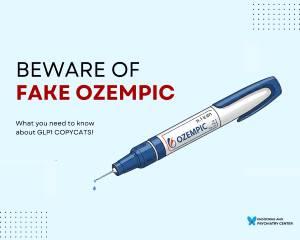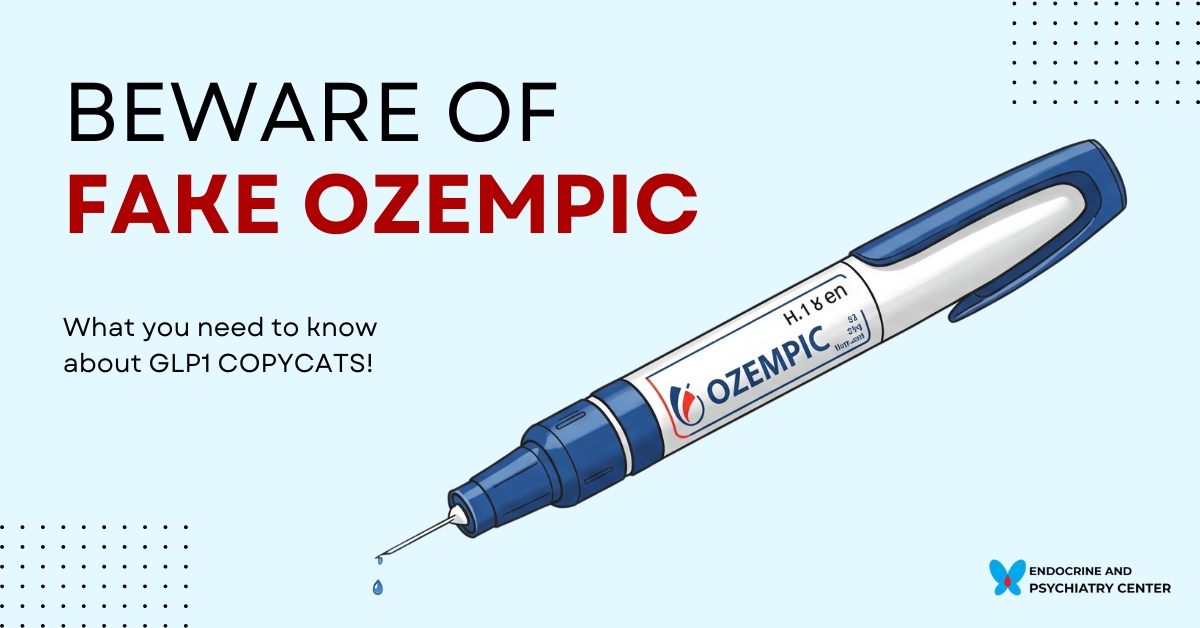- About Us
- Locations
- Meet the Team
-
Patient Resources
-
-
Patient Information
-
-
-
Services
-
-
All Services
-
Proudly Part of Privia Health

Is That Ozempic Really Ozempic? What You Need to Know About GLP-1 Copycat Meds

Why Everyone's Talking About GLP-1 Drugs
You’ve probably heard the names: Ozempic, Wegovy, and Mounjaro. These medications help people lose weight and manage blood sugar. They belong to a group of drugs called GLP-1 receptor agonists. They’ve become super popular—and super hard to get.
But now, some compounding pharmacies are making their own versions of these drugs. And the FDA is investigating.
Why? Because not all copycat medications are safe.
This blog will explain:
- What GLP-1 drugs are
- What compounding pharmacies do
- What the FDA is worried about
- How to protect yourself
- What to ask your doctor
What Are GLP-1 Drugs, Anyway?
GLP-1 stands for glucagon-like peptide-1. It’s a natural hormone in your body that helps:
- Control blood sugar
- Slow down digestion
- Make you feel full
- Reduce appetite
GLP-1 medications mimic this hormone to help people with:
- Type 2 diabetes
- Obesity or weight issues
Some of the most well-known GLP-1 drugs include:
- Ozempic (semaglutide)
- Wegovy (semaglutide, higher dose for weight loss)
- Rybelsus (oral semaglutide)
- Mounjaro (tirzepatide, works on GLP-1 and GIP hormones)
These drugs are prescribed by a doctor and made by big pharmaceutical companies with strict quality rules.
Why Are People Turning to Compounding Pharmacies?
Because demand is high and supply is low.
People are having a hard time getting GLP-1 drugs. That’s where compounding pharmacies step in.
What is a Compounding Pharmacy?
It’s a special kind of pharmacy that mixes medications by hand. They might:
- Change the form (like a pill to a liquid)
- Add or remove ingredients for allergies
- Make drugs that are on national backorder
In some cases, this helps patients. But in other cases—like GLP-1 knockoffs—it can be risky.
What Is the FDA Worried About?
The FDA (Food and Drug Administration) protects the safety of medications in the U.S.
They recently started investigating compounding pharmacies making copycat versions of
GLP-1 drugs, like:
- Semaglutide (the ingredient in Ozempic and Wegovy)
- Tirzepatide (the ingredient in Mounjaro)
Why? Because these homemade versions might:
- Use ingredients not approved by the FDA
- Be made with lower quality standards
- Cause side effects or harm
In fact, some of these pharmacies are using semaglutide sodium or semaglutide acetate, which are not the same as what’s used in the FDA-approved versions.
What Does This Mean for You?
If you are taking or thinking about taking a GLP-1 drug from a compounding pharmacy, you need to be careful.
Here’s why:
- You might not be getting the real thing
- It might not work as expected
- It could cause unexpected side effects
- There may be no clear way to track problems
This isn’t to say all compounding pharmacies are bad. Many follow the rules and help people in need. But the FDA wants to make sure these GLP-1 versions are safe and effective.
What’s the Legal Side of All This?
Here’s the key: compounding pharmacies are only allowed to make copies of drugs if there’s a true shortage.
That means:
- They can’t make mass-produced “dupes”
- They must follow strict rules
- They should be using the same active ingredient as the real drug
But not all pharmacies are playing by the rules.
Some are:
- Advertising on TikTok or Instagram
- Promising big weight loss results
- Offering mail-order GLP-1 “shots” without a real doctor visit
This is a big red flag.
Real vs. Fake: How Can You Tell the Difference?
Here are a few things to check:
Real GLP-1 (like Ozempic) Suspicious GLP-1 Knockoff
Prescription only May offer without full doctor visit
FDA-approved label Generic label or missing info
Comes from Novo Nordisk (Ozempic/Wegovy) or
Eli Lilly (Mounjaro)
Comes from a local or online
compounding pharmacy
Sold at major pharmacies Sold via websites or social media
Consistent dosage May vary in strength or form
Tracked side effects Side effects may not be reported
properly
Have There Been Any Problems?
Yes. Some people have reported:
- Nausea, vomiting, or diarrhea
- Low blood sugar episodes
- Injection site infections
- Not losing weight as expected
- Strange ingredients listed on the vial
The FDA has even sent warning letters to certain pharmacies and clinics for unsafe practices.
What Should You Do If You're Using a Compounded Version?
Here’s what you can do to stay safe:
1. Talk to Your Doctor
Ask:
- Is this medication from an FDA-approved source?
- Is it okay to use a compounded version right now?
- Are there other options if the real version is unavailable?
2. Check the Pharmacy
- Is it licensed in your state?
- Do they explain where their semaglutide or tirzepatide comes from?
- Are they open about ingredients and side effects?
3. Report Problems
If you feel sick or think the drug isn’t working, report it to:
- Your doctor
- The pharmacy
- The FDA’s MedWatch system
This helps keep everyone safe.
What Are the Risks of Buying Online or on Social Media?
Many websites or “wellness” clinics claim to sell GLP-1 drugs. Some even use influencers to advertise weight loss.
But these can be dangerous because:
- There may be no real doctor involved
- You don’t know where the medicine comes from
- The drug may be fake or mixed wrong
- You may not have support if something goes wrong
If something sounds too good to be true—it probably is.
Can You Ever Trust Compounded Medications?
Yes—in some cases.
If the drug is on the FDA shortage list and the compounding pharmacy follows all the rules, it might be okay.
But you should:
- Talk to a trusted doctor first
- Use a licensed compounding pharmacy
- Avoid buying from ads or random websites
What Happens Next?
The FDA is still looking into this issue. They may:
- Shut down unsafe compounding pharmacies
- Create stricter rules
- Fine companies breaking the law
- Educate the public about safe options
Until then, it’s important to stay alert and make informed choices.
Quick Summary: What You Need to Know
- GLP-1 drugs like Ozempic and Wegovy help with diabetes and weight loss
- Some compounding pharmacies are making unapproved versions
- The FDA is investigating because of safety concerns
- Always check where your medication comes from
- Talk to your doctor before using any compounded drug
Ask Your Doctor These 5 Questions:
- Is my medication FDA-approved?
- Is it safe to use a compounded version?
- What side effects should I watch for?
- Are there safer alternatives during shortages?
- How can I report a problem if I have one?
Final Thoughts: Your Health Comes First
We understand how frustrating it is when medications are out of stock. But your health and safety matter more than anything.
If you’re thinking about using a GLP-1 drug—or already are—make sure it’s the real thing. Compounded drugs can help in certain cases, but they’re not always safe.
Always talk to your doctor, do your research, and trust your gut